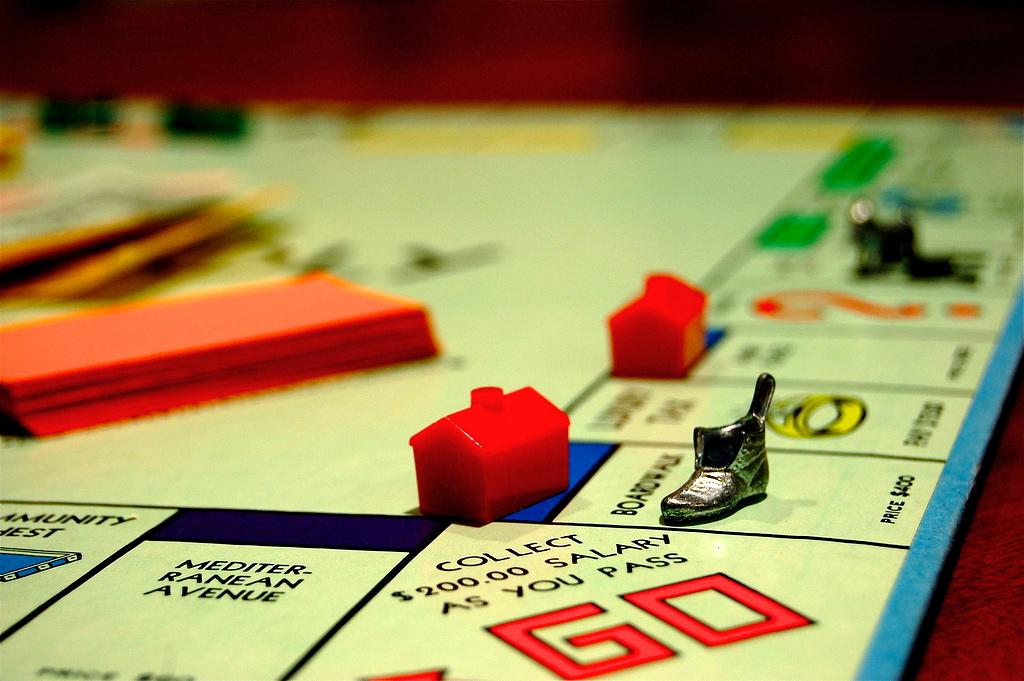Toy and game-making giant Hasbro announced today that it will loosen the regulations on its most famous economy in 2015.
Come next year, Monopoly players everywhere may be officially able to collect $400 when they land on “GO,” take home a pot for hitting “Free Parking,” and prevent jail-bound players from collecting rent. For the first time in decades, Hasbro is writing some unofficial “house rules” into the book.
Monopoly house rules are a time-honored tradition for players. They range from creative ways to inject new funds into the board game’s economy to giving Mom a free pass out of jail every time. According to Hasbro, nearly half of American Monopoly players have made one up, while 68 percent admit to not having read the official rulebook in its entirety.
To amend the game, Hasbro has turned to crowdsourcing. The company selected 10 common house rules and is allowing fans to debate their relative pros and cons until April 3. The “top” entries will be rolled out in a “House Rules” edition of the game this fall, and then added to the classic version of the game in 2015.
For the average player, these changes could mean little more than the official sanctioning of some favorite Monopoly-playing traditions. But economists say that allowing players to add their own regulations could have some interesting effects on the fictional economy of the game—namely, by making its patterns more closely aligned with those of actual financial markets.
The Monopoly economy created by the official rules is akin to one tightly and aggressively controlled by a central bank. Players each start with $1,500 and can gain additional funds through a limited number of methods—passing “GO” (collect $200), drawing certain cards from the “Chance” and “Community Chest” piles, and collecting rent from other players who land on their properties. The total money supply is also limited—to $15,140 in the Standard Edition and double that in the Deluxe.
“The fundamentals of the traditional game are set for a very strict monetary policy where you allow moderate amounts of the money to be entered into the markets but not large amounts,” explains Jock O’Connell, an international trade economist at economic consulting firm Beacon Economics.
Many of the most popular house rules, on the other hand, loosen this structure. Doling out $400 to players who land on “GO” quickly injects more money into the game’s economy. So does the “Free Parking, Fast Cash” rule that rewards players landing on that space with a big pot of fees paid by other players, and the “Lucky Roller” rule (collect $500 for rolling snake eyes).
O’Connell says the traditional rules of Monopoly are geared toward conservative, risk-averse strategies where you build properties slowly and “avoid more dangerous situations.” By throwing more money into the game, house rules create a more dovish monetary policy and encourage risk-taking among players.
If this is starting to sound something like the real economy, that’s because it is. The U.S. Federal Reserve has been using its own loose money policy, known as “quantitative easing” or QE, for some time to stimulate the American economy. Under the massive program, the Fed has bought tens of billions of dollars in Treasury bonds each month while simultaneously holding the interest rate near zero. The hope is that flooding the markets with capital while keeping rates low will encourage companies to invest and banks to lend—overall jump-starting the economy.
House rules in Monopoly can stimulate the artificial economy in a similar sort of way. In the real-estate trading board game, the added flow of money tends to accelerate the pace of play by prompting players to buy more and build faster, says Dan Hamermesh, a professor of economics at the University of London.
O’Connell agrees that house rules typically lend themselves to a faster paced game, but he also believes that they fundamentally turn Monopoly from an idealized economy into a better approximation of the financial systems people deal with every day.
“The fact that there are house rules means that people want to take the game and make it more like what they see in the financial markets,” he says. “People who have taken the rules into their own hands are probably trying to more closely emulate what they see happening in financial markets around the country and on Wall Street.”
